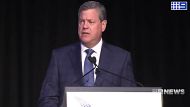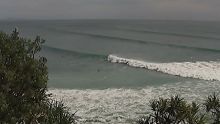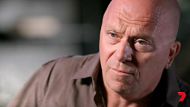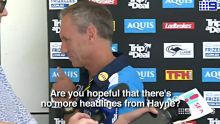"That's the last time I'll ever have to talk to that pack of bastards," Campbell Newman intoned as he left his last ever press conference in the dying hours of the 2015 Queensland election campaign.
He was referring to the media. But he may as well have been talking about his former allies and friends, Jeff Seeney and Tim Nicholls.
More QLD News Videos
Nicholls: 'I wasn't in charge'
LNP leader Tim Nicholls promises "no forced redundancies" and no "mass leasing, privatisation campaign" if he becomes Premier. Nine News
The Queensland troika of power that had swept to an unprecedented majority in 2012 had been decaying for some time before the Newman government's humiliating election defeat just one term later. Now, with Newman publicly humiliating Nicholls and his attempt to distance himself from the Newman government's legacy, the fractious relationship has the potential to cost the LNP a second consecutive election.
Doomed from the start

Seeney met Newman for the first time on the deck of Nicholls' Hendra home, where the idea was floated to have the then-popular Brisbane Lord Mayor lead the LNP at a state level.
Newman was intrigued, and bored of council politics, where he reigned supreme. Seeney and Nicholls, tired of opposition, wanted to win.
The arrangement suited all of them in the short term, but the unusual way Newman was parachuted in would ultimately lead to distrust and disarray as the task of governing got harder.
Ultimately, Newman could never adjust his unilateral leadership style, which had served him so well as lord mayor, to the bigger stage of state parliament, where long-time parliamentarians bristled at his headstrong approach and he sensed conspiracy in their longer-term relationships.

"The breakdown wasn't just one thing, it was a thousand cuts over a long period of time and almost as soon as the government was sworn in," one LNP source told Fairfax Media.
"There was jealousy almost immediately, with Campbell looking over his shoulder at what Tim, and to a lesser extent, Jeff were doing, thinking that they were out to get him.

"He had just won an election with 78 seats in an 89-seat parliament and he thought there was going to be a coup. There was a breakdown in staff, everyone thought everyone else was out to get them and it all came top down.
"He never transitioned from lord mayor to premier. He didn't understand how the politics worked. While in council, he was beholden to no one, including the party. He did what he wanted. You can't do that in parliament. And he never understood the magnitude of that switch."
He would rather burn down the house with Nicholls in it, than see the LNP returned to government with Nicholls as Premier.
As the party rushed to implement policies it had spent the better part of 15 years in opposition dreaming about, Newman became the face of every single change - whether he supported it or not.
Amid ideological changes to the state's civil partnership legislation, which Newman had fought against, the slashing of the public service and allegations of cronyism, undermining and conspiracies began early.
Newman couldn't understand the backlash to his changes. For a man used to spotting potholes and calling straight through to council maintenance to have them repaired – immediately – the slower pace of state parliament – and the politics – began chafing from almost the beginning.
"And the worse things got for the government, the worse things got for Campbell," said another LNP figure.
"He just couldn't understand why his message wasn't getting through, why what we were doing wasn't getting through. He'd never really had to sell anything before, but I don't think he got all the support he could have."
The policy that drove a wedge
By the time 'Strong Choices', the Newman Government asset sales plan rolled around in 2014, the relationship between Nicholls and Newman was hanging by a thread.
Newman opposed the policy internally at first, but Nicholls' win in the cabinet – putting asset sales on the agenda – severed the relationship.
Former ETU State Secretary Peter Simpson – one of the biggest bugbears of the Newman government – said he had written to Newman just after the 2012 election win to get his views on asset sales.
"His response outlined that he didn't have much interest in it, although if he did, he would take it to the people, unlike Bligh," Mr Simpson said.
"He made a number of statements in the press after that regarding not seeing privatisation as the panacea to the state's ills.
"That's why we found it so curious when Strong Choices was announced. We later learnt it was Nicholls who was driving the agenda, along with Treasury."
Newman made Nicholls take ownership of the ultimately doomed policy, sending him on a listening tour across the state to sell the deeply unpopular plan.
"But he signed off on everything, every single step of the way," one senior LNP member said.
"He was just as excited as everyone else, because it meant he could build more tunnels and things. He wanted to be known as the infrastructure premier and he knew that was the way to get him there."
Leaders take responsibility for hard decisions that have to be made-I did. Time for@TimNichollsMP who drove asset sales & cuts #qldpol
— Campbell Newman (@CampbellNewman) March 7, 2017
If @TimNichollsMP had no role in the policies of my govt (yeh right !) what are his policies now and how do they differ ? #qldpol
— Campbell Newman (@CampbellNewman) March 7, 2017
Publicly, all three would deny there was a problem with the relationship, despite repeated questions from journalists, who couldn't miss the looks of frustration and, at times, contempt being thrown.
But when the election was lost Newman turned the blame on Strong Choices and pointed the fingers at those he believed responsible – Nicholls and Seeney.
"He just couldn't understand that he played a role, that people didn't like him," another senior LNP figure said.
"Perfect example – when we lost the by-elections. There was an internal revolt after he came out and said that voters just weren't listening to what we were saying, because he just couldn't take any responsibility for it.
"We needed the public to know that we had heard them and would change, but he just refused to back down. It wasn't until there was that second big loss in Stafford – and a lot of shouting, because the gloves were well and truly off by then – that he came out and begrudgingly apologised.
"Even then, he had to have his digs at Nicholls and Seeney, saying sorry for policies they had pushed, which hadn't really come up."
Election spells the end
By the time of the doomed election campaign, called so quickly in January 2015 it caught LNP MPs unaware, Nicholls and Newman were barely talking.
Other ministers who had watched the breakdown would tell Nicholls that he just had to "ensure the election". Newman losing Ashgrove was a given. No one believed the LNP would lose government.
Seeney's admission following the election that mistakes had been made from the beginning and the party didn't properly understand the magnitude of parachuting someone unfamiliar with state politics into the leadership was the final stake in their relationship.
Following the election, political circles would watch as Newman ignored Nicholls and Seeney at events and took jabs from the sidelines, first on his book tour, and later, on Sky Television.
That ramped up following the leadership coup which saw Nicholls replace Lawrence Springborg as LNP leader.
"Bligh, Beattie, they all moved away when they lost their elections. And for the most part – especially Bligh – they kept their mouths' shut – even when their legacies were being trashed, because they knew it was for the betterment of the party, even if they hated some of the personalities," another senior LNP member said.
"But Newman? Newman not only stayed, he started lobbing bombs. And you can see how happy he is to be doing it. He would rather burn down the house with Nicholls in it, than see the LNP returned to government with Nicholls as premier."
Made to take the blame for more than his fair share of what was a dysfunctional government heady on power and too eager to wield it, Newman's bitterness is understood by many in the party, despite the frustration at his tactics.
Both Nicholls and Seeney appeared at the unveiling of Newman's formal portrait in the Premiers' Hall of the state parliament, which features the would-be infrastructure premier wearing a Brisbane City Council high-vis vest, the three putting appearance above fractured relationships,
But not many were surprised at the very public smack down Newman delivered to Nicholls over social media just days later, following the LNP leader's own very public distancing from the legacy he helped to create. Labor has already seized on the tweets, posting them on a billboard in Fortitude Valley.
"It was sh*t, but he had to do it – he has to put distance between him and the Newman government, if he wants to win the next election. Which he does, which we all want him to do," one LNP MP said.
"It grates, because we all know he was part of the leadership team which led us to that defeat. But it's what leaders have to do. Palaszczuk was part of the Bligh government. She has had to apologise for that. I am sure that hasn't gone down well in some Labor circles, but this is politics. You do what you have to do to get into power and start putting in the policies you believe are right for the state.
"But now we have a former leader, who like Abbott, who like Latham, can't separate themselves and their own ego, from the greater good.
"He'd rather see Nicholls lose, than us win."
Another LNP figure had a slightly different take.
"He's doing it, because if Tim wins, and there is a strong chance he will, then it shows that it wasn't Strong Choices, it wasn't asset sales which lost us the (2015) election, it was deeper than that.
"Because if the man who was the face of that plan goes on to become premier, then it means that there was a lot more going on in that election loss. And I don't think he wants to face that. Who would?"












